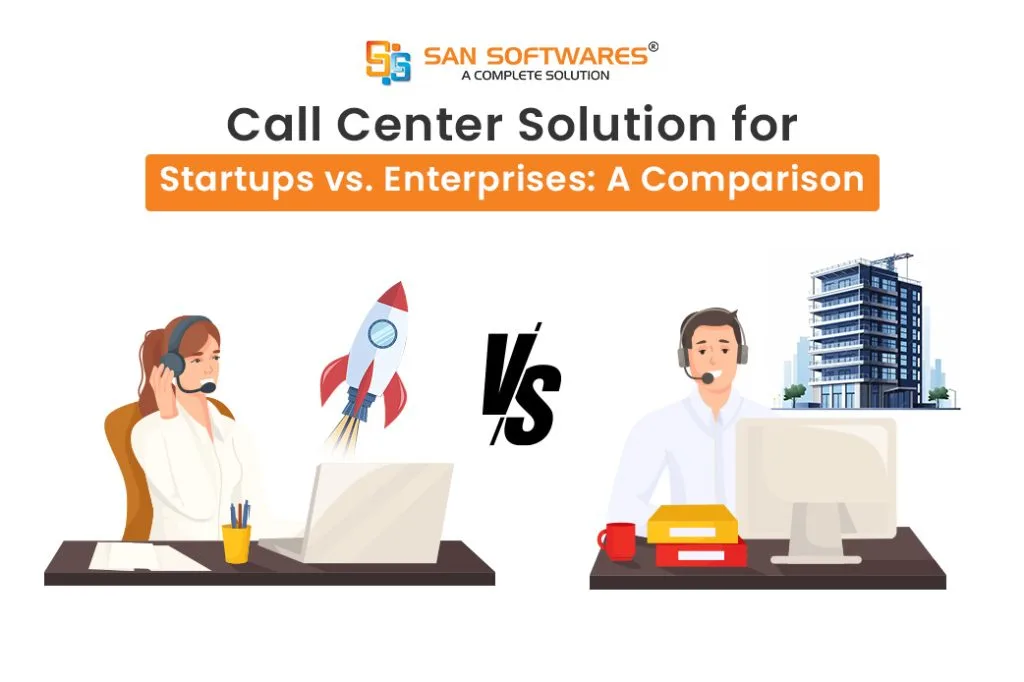Table of Contents

Today’s competitive market, business communication plays a important role in brand loyalty and customer satisfaction. If you’re operation a small startup or a large enterprise, having the best Call Center Solution is no longer a just fancy thing, it’s a need. However, what works for a startup may not a good fit for an enterprise, and vice versa.
Lets discover what are the main differences, similarities, and features that define the best Contact Center Solution for startups or enterprises, helping you make a business smart.
A Call Center Software handles blended calls between a business and their customers. It smoothens communication through features like:
Advanced Call Center Solutions go just voice, it include channels like email, chat, social media, and SMS, delivering omnichannel support for customer satisfaction.
The communication for startups and enterprises vary huge because of differences in scale, budget, and goals.
| Factors | Startups | Enterprises |
|---|---|---|
| Team Size | Small (5–50 agents) | Large (hundreds to thousands) |
| Budget | Limited, cost-sensitive | High, with allocated IT investment |
| Scalability Needs | Rapid and flexible growth | Structured and long-term expansion |
| Support Channels | Primarily voice-based | Omnichannel (voice, chat, email, social) |
| Reporting Needs | Basic metrics | Advanced analytics and performance dashboards |
Understanding these factors helps determine which Call Center Software fits your operational goals and customer service vision.
For startups, the focus is on quick deployment, affordability, and scalability. They need tools that grow as the business grows without heavy infrastructure costs.
Cloud-based call center products remove contingency on pricey hardware or upkeep. Startups are able to subscribe for pay-as-you-go service.
Majority of start-up suitable contact center solutions are plug-and-play, which easily connect to CRMs, WhatsApp, or email systems.
As hybrid and remote work rise, cloud systems allow agents to access anywhere, perfect for flexible work.
Startups can start with minimum features such as IVR, forwarding, and analytics, incrementally adding sophisticated features as they grow.
As more customers are added, startups are able to add users, channels, or integration easily without severe disruptions.
Example Use Case:
A food delivery startup using a Cloud Contact Center Solution can instantly route customer calls to available support agents, record interactions for training, and integrate with order management tools for faster resolutions, all within an affordable monthly plan.
Businesses process huge customer numbers and require strong, secure, and tunable systems to handle sophisticated work flows.
Key Advantages for Businesses
Businesses are dependent on deep-level insights such as agent performance, call handle time, and customer emotions for data-based decisions.
Enterprise-level contact center products combine several communication channels—voice, live chat, email, social sites, and SMS, into a single dashboard for single-source communication.
Businesses frequently require CRM, ERP, or HRMS integration. Custom APIs and automation boost workflow productivity.
Protecting data, encryption, and GDPR or PCI DSS compliance are essential for bigger organisations.
Artificial intelligence-powered routing, speech and analytics, and chatbots assist large enterprises in scaling customer satisfaction and shortening the response time.
Example Use Case:
A major telco employs an enterprise Call Center Solution with predictive dialing, sentiment analysis, and AI chatbots to process millions of interactions per month—providing individualized customer service 24/7.
| Feature | Startup Call Center Solution | Startup Call Center Solution |
|---|---|---|
| Cost | Affordable, subscription-based | High investment, long-term ROI |
| Deployment | Cloud-based, instant setup | Cloud or on-premise (customizable) |
| Scalability | Quick and flexible | Structured and planned |
| Analytics | Basic reports | Advanced dashboards |
| Integration | Limited but easy | Deep API and CRM integration |
| Automation | Minimal (basic IVR) | Extensive (AI bots, workflows) |
| User Control | Simple admin dashboard | Multi-level permissions |
| Support | Self-service and chat suppor | Dedicated enterprise account manager |
Deciding between a startup-friendly and enterprise-level call center software, keep the following points in mind:
Most software developers nowadays provide hybrid call center solution, platform that suits both start-ups and expanding businesses. Such systems are humble in their infancy but are expandable by adding enterprise-class extensions such as AI analytics, workforce management, and omnichannel routing as your business grows.
This method maintains consistency and adaptability, omitting migration of systems during scaling.
Whether your business is a ramp-up startup or a growing enterprise, a proper Call Center Solution serves as a backbone of your customer communication strategy.
For startups, ease, cost-effectiveness, and flexibility are paramount. For large companies, it’s about control, customizing, and cognitive automation.
The solution is to identify a Contact Center Solution which suits your goals of business, scales seamlessly, and provides a seamless customer experience across each interaction.
Because at its core, regardless of how large your business is, customer trust, which is fueled by effective communication, fuels growth.
The primary distinction is based on scaling and intricacy. A startup call center solution is aimed at affordability, ease of setup, and basic functionality such as IVR and call route. However, an enterprise call center solution provides sophisticated analytics, multi-channel capability, automation, and integration of CRM deep to manage vast customer interactions on a large scale efficiently.
Cloud-based call center software is best for start-ups for it asks for no hardware expenditure, is remotely easy to access, and is easily expandable as a business expands. They give necessary functionalities such as call forwarding, IVR, and real-time reports at a reasonable subscription cost.
A strong contact center solution empowers businesses to provide seamless, individualized customer service across a variety of communication channels—including voice, chat, email, and social media. It unites communication, automates proliferations of routine work, and offers real-time analysis, empowering businesses to enhance efficiency while increasing total customer satisfaction.
SAN Softwares is a company dedicated to providing complete software solutions to Corporate and end-user customers.

SAN Softwares is a company dedicated to providing complete software solutions to Corporate and end-user customers.

© 2026 SAN Softwares Pvt Ltd | All Right Reserved
Enter your details to receive an OTP